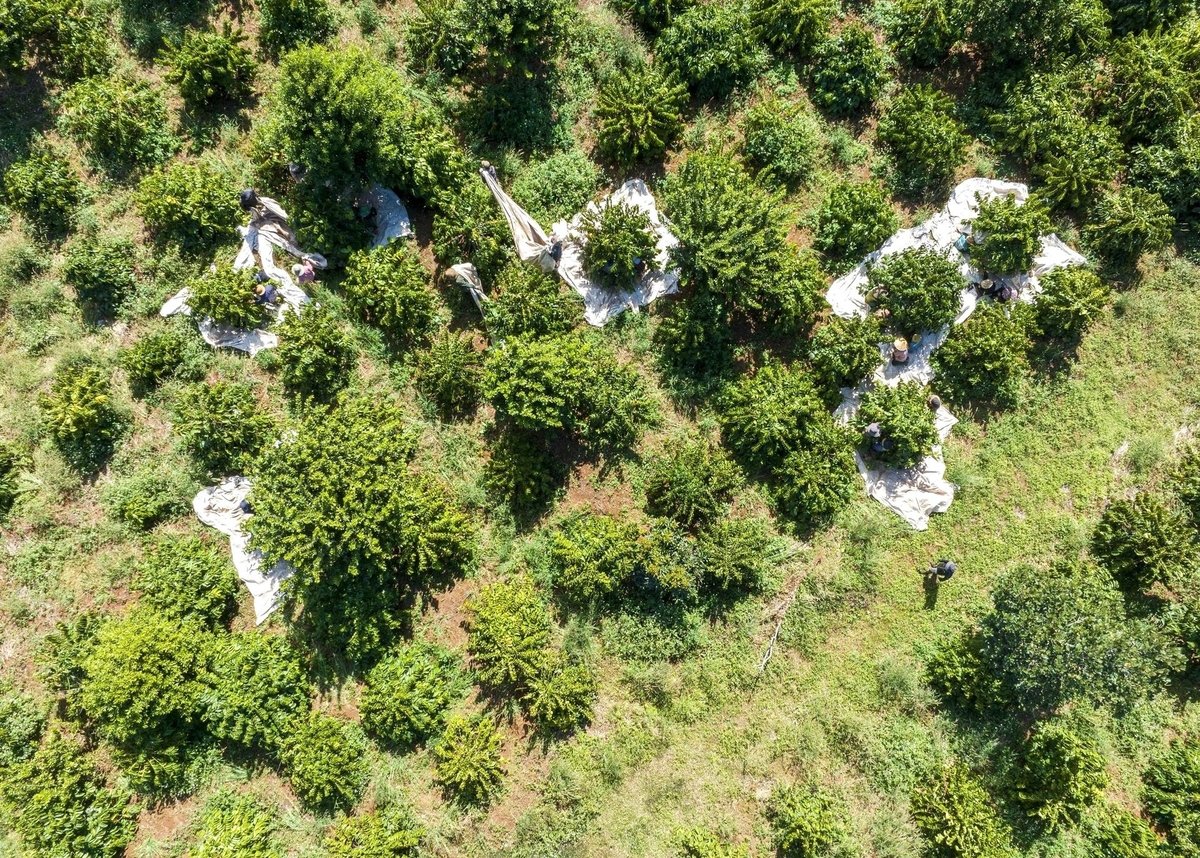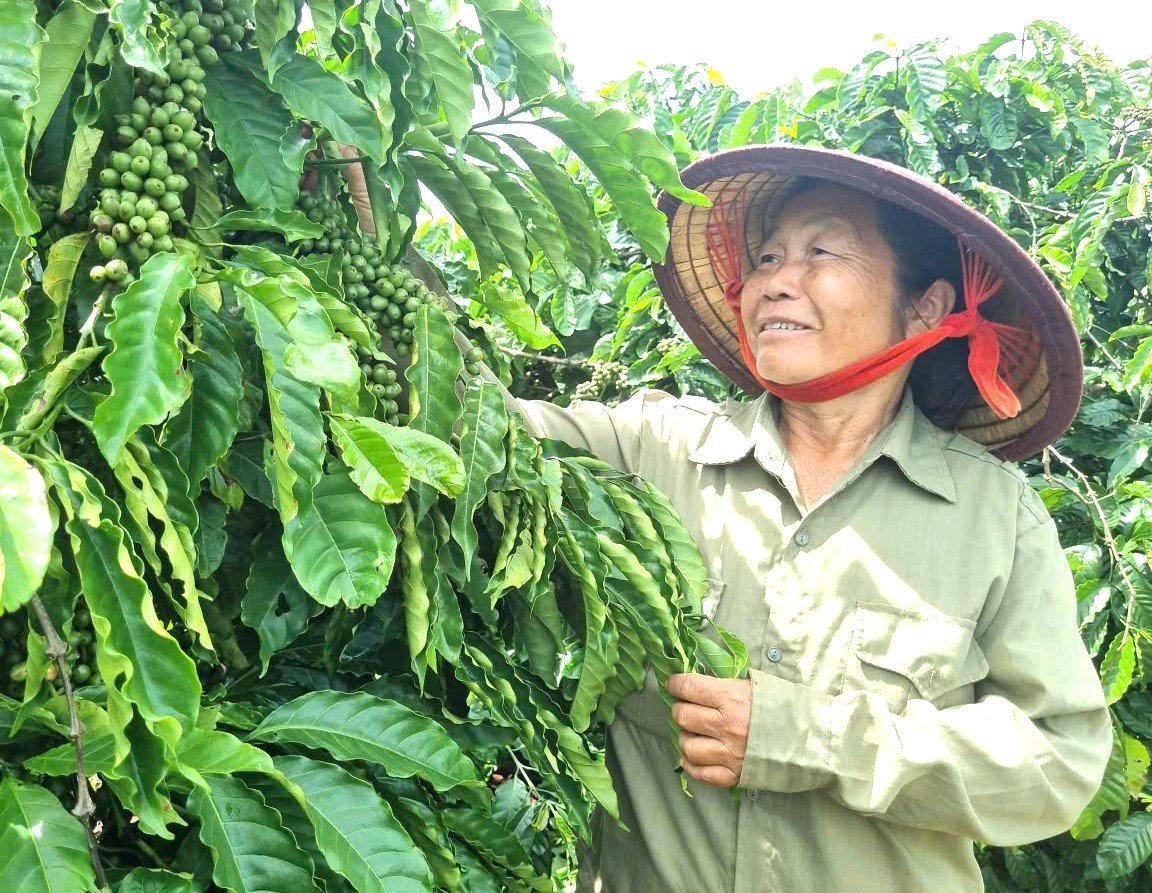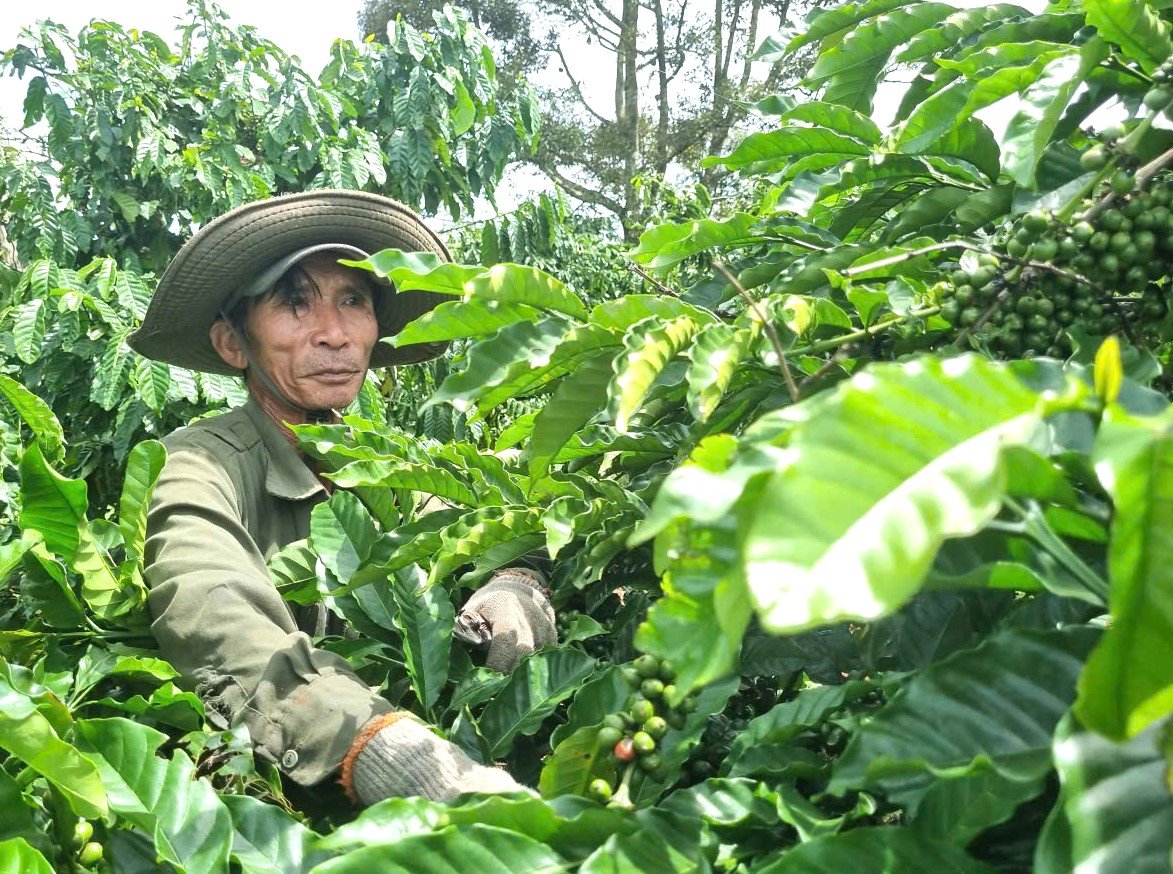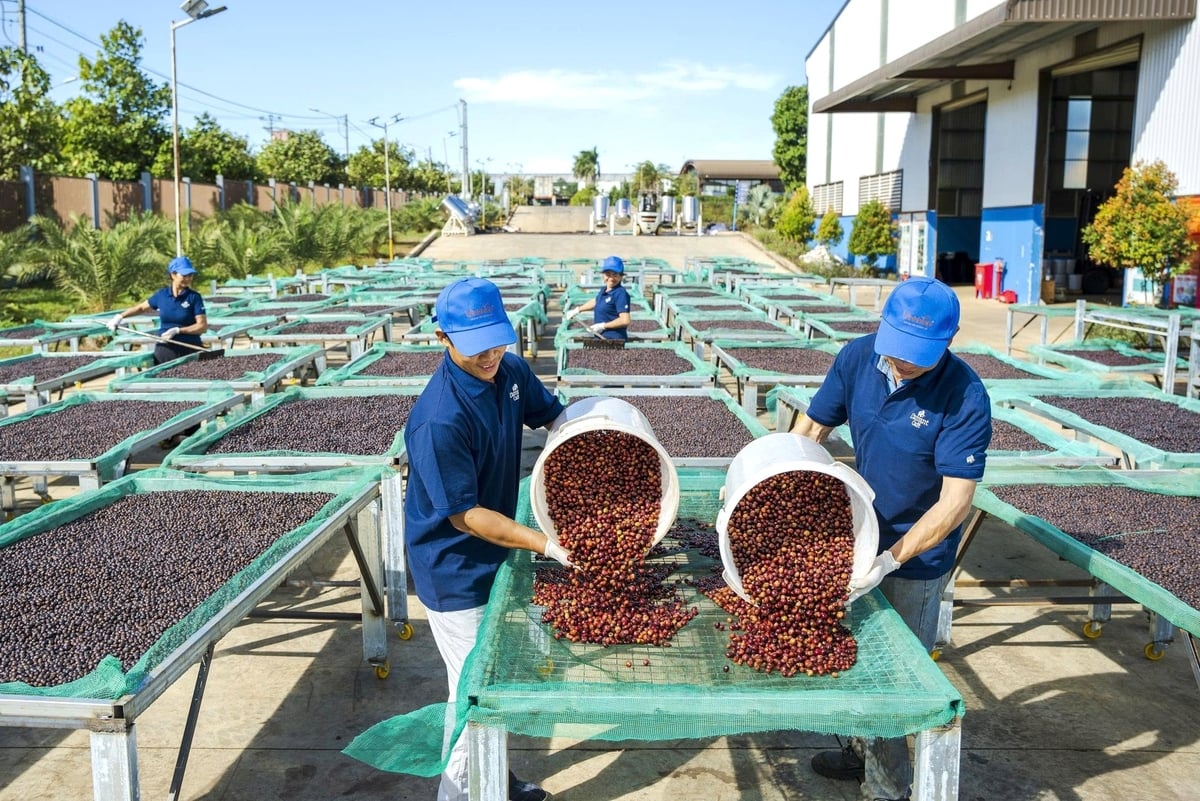November 19, 2025 | 00:33 GMT +7
November 19, 2025 | 00:33 GMT +7
Hotline: 0913.378.918
November 19, 2025 | 00:33 GMT +7
Hotline: 0913.378.918

The 42-hectare organic-certified coffee farm of Vinh Hiep Co., Ltd. Photo: Tuan Anh.
More than 20 years ago, from Nam Yang, Kon Gang, H’ Neng to Glar of the former Dak Doa district (Gia Lai province) was still a wild land, stretching across barren hillsides. At that time, local life revolved mainly around cassava fields, corn plots, and a few rice paddies.
In the following years, coffee began to take root, and everything changed. People gradually abandoned cassava and boldly shifted to coffee cultivation. Once-barren hills have now turned into vast, vibrant green coffee gardens, grown with an organic orientation.
When we returned to Kon Gang, clusters of large, round green coffee cherries were crowding the branches, hidden beneath the foliage as if sheltered. The road leading to Kon Gang had also changed—it was wider and cleaner than before.
In 1999, leaving her hometown of Ha Nam, Mrs. Vu Thi Tu and her family used their modest savings to buy a 4-hectare plot of red basalt land in Tam Diep hamlet, Kon Gang commune. At that time, it was nothing but weeds, with no electricity and no water. Having never grown coffee, she still boldly followed the trend, “picking up” cultivation techniques from those with experience. However, by relying on chemical fertilizers and pesticides, her coffee trees yielded so poorly it pained her to see.
To support the family, she turned to planting cabbage, ginger, passion fruit, whatever was in season, yet life remained difficult. Still, she never once thought of cutting down the coffee.
She said: “On this red basalt land, coffee is the crop that truly keeps people rooted. That’s why, among the short-term crops, there remains our coffee garden - the place where my family places its trust.”

The coffee farm cultivated along organic practices by Mrs. Vu Thi Tu’s family. Photo: Tuan Anh.
Under the blazing sun of the Central Highlands, Mrs. Tu’s 2.5-hectare coffee garden, more than 20 years old, remains lush and full of heavy branches laden with fruit. Not stopping there, she has boldly planted an additional 3 hectares of coffee, soon to enter its first harvest season, promising a bumper crop.
“Our family is most fulfilled knowing the coffee is grown organically, meeting good agricultural practice standards such as VietGAP and 4C. This has been a long-cherished dream - to produce coffee that is not only delicious but also brings real economic value to the family,” Mrs. Tu shared, adding that all of their harvested coffee is purchased by enterprises for export.
Now, after more than two decades tied to the red basalt soil of Kon Gang, Mrs. Tu’s family enjoys a prosperous and abundant life. Their spacious, well-built home nestled in the midst of a lush green coffee garden stands as proof of years of tireless hard work.
Leaving Kon Gang behind, we headed toward Dak Doa commune, where lush green coffee gardens blanket the villages. What impressed us most was that much of this coffee land belongs to the BaNa people, who have become true garden owners, applying techniques and caring for their coffee in an organic direction.
Mr. ANghem (Dak Doa commune) had spent his life growing rice and cassava, living year-round with just enough to eat, never dreaming of prosperity. In 1995, he boldly cleared a few rods of land to plant his very first coffee trees. In the early years, he relied only on chemical fertilizers and pesticides, doing whatever it took to make the trees bear plenty of fruit.

Organic coffee gardens are always safe and known for their rich, delicious quality. Photo: Tuan Anh.
Then, witnessing his garden becoming polluted, he was startled to realize that the price paid was far too high. From that moment, he was determined to change: shifting to organic cultivation. Today, he owns 2.5 hectares of organically grown coffee, with products purchased steadily by enterprises. In the upcoming harvest, he expects to reach more than 10 tons of coffee beans – a figure many farmers can only dream of, especially in the context of coffee prices being at such a high level today.
Beneath the lush coffee canopies, the footsteps of Mr. Le Huu Anh, Director of Lam Anh Agricultural and Service Cooperative, move as if familiar with every plot of land and every row of trees. As he walks, he shows farmers how to prune branches and apply organic fertilizer.
Having been attached for nearly a decade to the coffee-growing areas of Dak Doa, Mr. Huu Anh has become a true companion to the people, especially the BaNa community, on their journey toward organic agriculture.
He recalled that in the early days of mobilization, many shook their heads, fearing risks and reduced yields. Yet, season after season, organically grown coffee gardens became greener, bore more fruit, and cost less to maintain. Today, throughout Dak Doa commune, there are now hundreds of households joining him in cultivating coffee under 4C, UTZ, and organic standards.
Pausing for a moment, Mr. Huu Anh shared: “Years of tireless searching and learning have given me the belief that only organic agriculture can eliminate the harmful substances clinging to the soil and to people’s lives. But I must also admit – this path is far from easy, especially in vast farming areas where industrial-style production has been deeply rooted for generations.”

Vinh Hiep Co., Ltd. processes coffee for export. Photo: Tuan Anh.
To persuade others, he started with his neighbors and the nearby gardens. With knowledge and persistence, he believed that change was entirely within reach.
“Each time I see the gardens thriving and heavy with fruit, grown in harmony with nature, I am even more convinced that real, tangible results are the strongest form of persuasion. And once organic agriculture can be expanded, its benefits will not only reach the villages but extend to the entire nation,” he shared.
In the coffee industry, the name Vinh Hiep is always mentioned as a bright spot. In 2024, the company’s export turnover reached 525 million USD, accounting for 10 percent of the country’s total coffee exports. From certified organic farms, Vinh Hiep has brought the flavor of the Central Highlands coffee to the world – a commitment to green, clean, and sustainable agriculture.
Mr. Duong Van Thanh, Head of Sustainable Development at Vinh Hiep Co., Ltd., could not hide his pride when speaking about the company’s 42-hectare coffee farm, the first in Vietnam to be certified Organic by the USDA. This achievement was not only a result but also a milestone in the pursuit of clean agriculture.
Beyond that, Vinh Hiep has worked with cooperatives and farmers to expand 300 hectares of organically grown coffee, meeting the strict standards of import markets.
“We want to build a clean agricultural production system, protecting the environment so that Vietnamese coffee can reach even further,” Mr. Thanh shared.
Ms. Nguyen Thi To Tran, Deputy Director of the Department of Agriculture and Environment of Gia Lai Province, stated that Gia Lai currently has more than 57,000 hectares of coffee cultivated under standards such as VietGAP, 4C, GlobalGAP, Organic, and Rainforest Alliance. Many Gia Lai coffee brands have already penetrated demanding markets, including the United States, the European Union, and Japan. Looking ahead, the agricultural sector will continue to provide information on market demand for agricultural products, quality standards, and risk alerts, while also supporting businesses in enhancing trade promotion activities and participating in fairs and exhibitions to further expand export markets.
Translated by Phuong Linh

(VAN) 'If we can address disease challenges and properly plan farming zones, Vietnamese shrimp can absolutely rise to lead the world,' Mr. Le Van Quang affirmed.

(VAN) The year 2025 continues to mark a significant footprint for Chanh Thu Fruit Import-Export Group Joint Stock Company (Chanh Thu Group) in the international market.

(VAN) Participating in the exhibition celebrating the 80-year tradition of the Agriculture and Environment sector, Dong Giao Food Export Joint Stock Company (DOVECO) showcased a range of products utilizing new technologies.

(VAN) Vietnam’s pepper export turnover in the first 10 months of 2025 reached $1.39 billion, already surpassing the full-year figure of 2024.

(VAN) AGRITECHNICA 2025 has impressively reaffirmed its position as the world’s leading trade fair for agricultural machinery.
/2025/11/17/4947-2-104601_225.jpg)
(VAN) The international market is growing rapidly, creating major opportunities for Viet Nam's tilapia industry.
/2025/11/17/1234-2-010716_981.jpg)
(VAN) Deputy General Director of Viet Nhat Group Nguyen Dang Ngoc shared experiences on building linkage chains and developing sustainable tilapia farming that meets international standards.